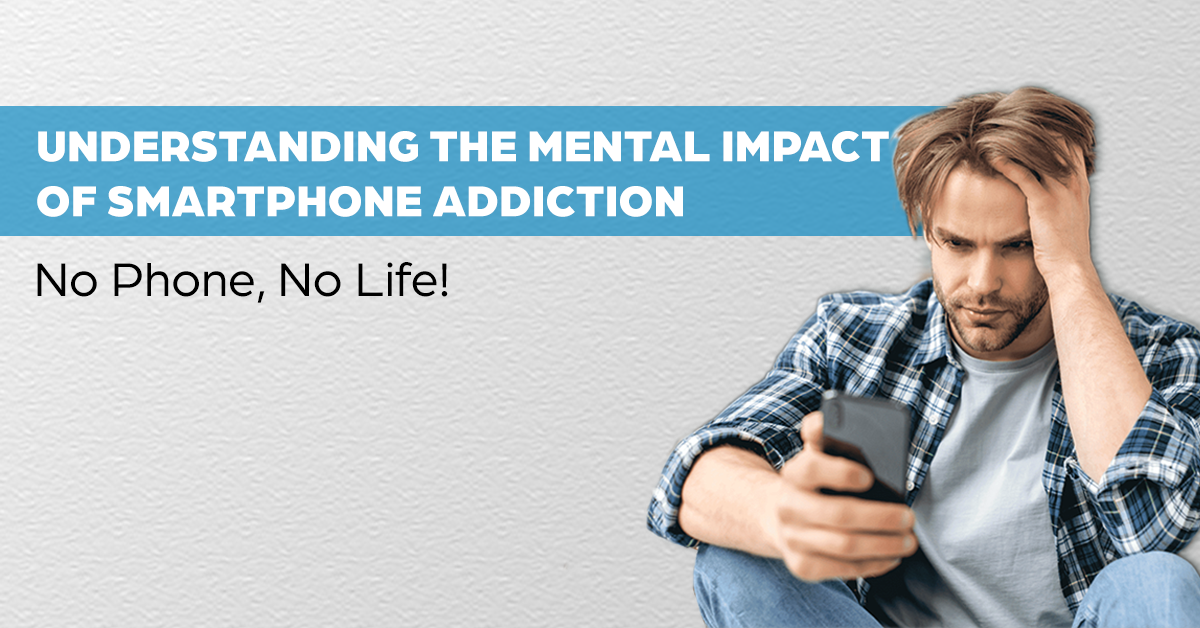
Understanding the Mental Impact of Smartphone Addiction
No Phone, No Life: Understanding Smartphone Addiction and Its Mental Health Impacts
In today's digital age, smartphones have become an integral part of daily life for everyone, from children to senior citizens. Many of us feel a strong dependence on our smartphones, often believing we can't live without them. However, this widespread use has led to a serious issue: smartphone addiction. This addiction is a growing mental health concern that affects millions of people worldwide, cutting across age groups and demographics. It can lead to significant mental health problems, including poor sleep quality, heightened stress levels, anxiety, and depression. Let’s delve into the psychological effects of phone addiction.
What is Smartphone Addiction?
Smartphone addiction goes beyond just frequent phone use; it involves deeper psychological impacts. People who suffer from smartphone addiction often find themselves unable to put their devices down. They may experience anxiety and irritability when separated from their phones or when their access is restricted. Common signs include obsessively checking notifications, losing track of time while using the device, and neglecting other activities or relationships. While many joke about smartphone addiction effects, it is a serious issue. In recent years, phones have transformed from simple communication tools to all-encompassing digital devices, making our lives increasingly dependent on them.
The Impact of Smartphone Addiction on Mental Health
Increased Anxiety Levels
Smartphone addiction often results in what is known as "digital detox anxiety." Digital detox anxiety is the feeling of unease or anxiety experienced when attempting to disconnect from digital devices, such as smartphones or social media. This anxiety can arise from fears of missing out (FOMO), a sense of disconnection from social circles, or worries about being unable to access information. This concern is increasingly relevant, manifesting with physical symptoms such as sweating, shaking, and heart palpitations when separated from the phone for too long. Additionally, the constant comparison to seemingly perfect lives portrayed on social media can lead to feelings of inadequacy and insecurity, further increasing stress and anxiety.
Difficulty Sleeping
The blue light emitted by phone screens can interfere with melatonin production, disrupting sleep patterns, especially when phones are used within two hours of bedtime. Keeping phones nearby while sleeping can increase stress levels and decrease relaxation, further impacting sleep quality.
Decreased Real-World Social Interactions
Smartphone addiction effects can lead to a reduction in meaningful face-to-face interactions with friends, family, and peers. Constantly checking for updates or notifications can limit engagement with the world around us, leading to feelings of isolation and loneliness.
Depression
Comparing one's life to the idealized versions seen on social media can lead to feelings of worthlessness and inadequacy, potentially resulting in depression. Prolonged exposure to social media content has been linked to increased depression, particularly in individuals prone to negative thinking. Withdrawal from smartphone use can also cause feelings of loneliness, frustration, irritability, and fatigue.
Decreased Performance at Work or School
One often-overlooked effect of phone addiction on the brain is its impact on productivity. Overuse of smartphones can lead to distraction and decreased performance at work or school, as constant checking of notifications or browsing takes time away from tasks requiring focus.
Relationship Issues
Increased smartphone use can also lead to relationship issues. When someone is glued to their phone, it creates a barrier between them and their partner, family, or friends, leading to feelings of neglect and loneliness in the other party.
The Road to Recovery: Seeking Help
Acknowledging smartphone addiction is the first step toward recovery. For individuals facing the mental health challenges linked to overuse, finding the right support system is essential. The Best Rehabilitation Centre in Mumbai, Calida Rehab, offers personalised treatment programs designed to help individuals overcome digital addiction and mental health. Their professional guidance and therapeutic interventions can significantly reduce the negative effects of smartphone overuse.
By seeking help from a trusted Rehab Centre in Mumbai like Calida Rehab, individuals can embark on a journey toward recovery, improving their digital addiction and mental health and overall quality of life. These programs aim not only to address the psychological impacts of smartphone addiction but also to restore balance to everyday activities—leading to better sleep, more meaningful social interactions, and improved emotional well-being.
Identifying Signs and Taking Action
To recognize smartphone addiction effects, be mindful of behaviours like anxiety when the phone isn’t around, constant reliance on it, and the neglect of face-to-face interactions. Disrupted sleep, reduced focus, and lower productivity are also key indicators. If these red flags are present, action is necessary. For personal improvement, set limits, turn off notifications, and create boundaries around phone use. For clients, encourage breaks, establish achievable goals, and have open conversations about their habits. Teaching coping skills and offering alternative activities can greatly assist both you and your clients in managing smartphone addiction effectively.
Conclusion
Smartphone addiction is a growing concern, and the mental health effects of smartphone use consequences are far-reaching, from anxiety and depression to poor productivity and strained relationships. However, by recognizing these signs early and seeking support, individuals can regain control of their digital habits. The Best Rehabilitation Centre in Mumbai, such as Calida Rehab, offers a structured approach to overcoming these challenges. Through personalised care and expert guidance, individuals can break free from the grips of smartphone addiction and create a healthier, more fulfilling lifestyle.
